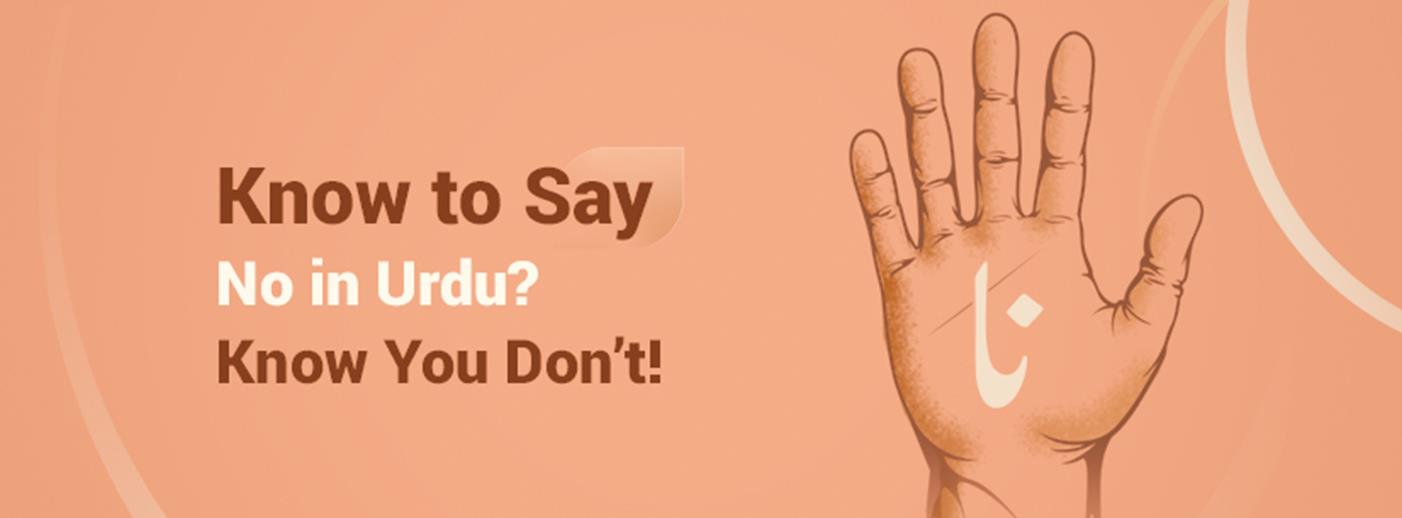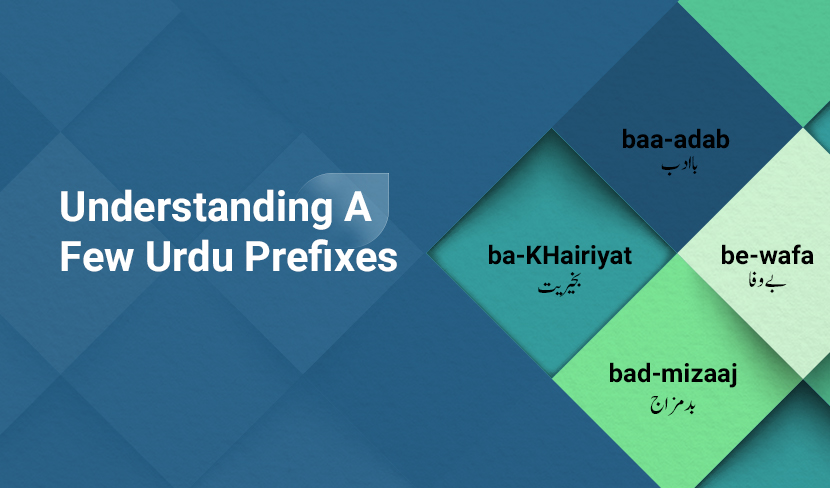अधिक खोजे गए शब्द
सहेजे गए शब्द
खिस्यानी बिल्ली खम्बा नोचे
जिसे क्रोध आ रहा हो वह अपनी खीझ या क्रोध दूसरों पर उतारता है, लाचारी में आदमी दूसरों पर क्रोध करता है, लज्जित व्यक्ति दूसरों पर अपनी लज्जा उतारता है, निर्बल की खीझ
कोशिश
कोई काम करने के लिए विशेष रूप से किया जानेवाला प्रयत्न, मेहनत, दौड़ धूप, प्रयत्न, प्रयास, चेष्टा, उद्योग, श्रम, उद्यम, उपाय, परिश्रम
आठ बार नौ त्योहार
सुख-सुविधा और आराम का शौक़ या लगन ऐसा बढ़ा हुआ है कि युग और समय उसको अल्प व्यय नहीं करने देता
चमनिस्तान
ऐसा बाग़ जहाँ फूल ही फूल हों, ऐसी जगह जहाँ दूर तक फूल ही फूल और हरा भरा नज़र आए, वाटिका, चमन, बाग़
दादरा
संगीत में एक प्रकार का चलता गाना (पक्के या शास्त्रीय गानों से भिन्न), एक प्रकार का गान, एक ताल
Know to Say No in Urdu? Know You Don’t!

During the Victorian times, one unsaid phrase of caution was known by all women alike:
‘You must know how to say no.’
Fast forward to now, it has only become much pregnant with gravity than ever!
Now its meaning doesn’t need to be spelled out; it’s out there, but how about prying into it literally?
Here’s the deal, in this blog we’ll try to pick up the many privative and negating particles that abound in Urdu and figure out how we can say yes by saying no!
Naa
Expressions like Naa-Samajh, Naa-Kaam, Naa-Laaiq, Naa-Aashnaa, etc. are common knowledge.
But Naa can be used in an affirmatory sense, too, like ‘Naa Kaho’ – don’t say, as opposed to ‘Kaho Naa’ – Do say!
Verbal acrobatics apart, ‘Naa’ can also sometimes appear as its short ‘Na’, and be prefixed; for instance ‘Nikamma’!
Interestingly, Naa and Na can affix to a single word and give different meanings! Take ‘Naa-Diida’, which means a blind person who can’t see anything, and ‘Na-Diida’, which means a greedy person who doesn’t see anything (except himself).
Be
Inspired from the Sanskrit privative ‘Vi:’, as in Virodh, Vidhroh, etc., ‘Be’ is commonly used to nullify nouns – ‘Be-Rahm’, ‘Be-Kaar’, ‘Be-Sharm’, and so on.
‘Be’ can also create double-negative words which are quite rare, like ‘Be-Kas’, Kas means somebody/nobody in Persian, so ‘Be-Kas’ literally translates to ‘one without no one’, i.e., forlornly, friendless.
Like Naa and Na, ‘Be’ can also diminish to ‘Bi’ and affix to words, like ‘Bayaabaan’, which is literally ‘Be-Aab-aan’, a place without water, i.e., a desert.
Ghair
In this context, Ghair means ‘other’. Its English equivalent is ‘not’, as in ‘fine/not fine’, similarly, ‘Latif/Ghair-Latif’.
Ghair and Naa can often appear synonymously, as in ‘Ghair-Maujuud’/'Naa-Maujuud’, but can come to yield different meanings, too, as in ‘Naa-Motabar’ – Not credible, and ‘Ghair-Motabar’ – Incredible.
Similarly, ‘Ghair’ and ‘Be’ can sometimes be used interchangeably but in some cases, they can contradict, like ‘Be-Ikhtiyar’ – helpless, and ‘Ghair-Ikhtiyar’ – involuntary.
In principle how these three differ is that the former two predominantly affix to nouns, while the latter conjoins with verbs/adjectives. But again, there’s no fixed rule either!
Laa
An Arabic privative, it appears mostly with Arabic nouns, as in ‘Laa-Waris’ (heirless), Laa-Ta’adaad (innumerable), etc.
But there is one queer word with which ‘Laa’ frequently appears, the Sanskrit-derived ‘Pataa’, forming ‘Laa-Pataa’ – missing, without a sign.
In comparison to the privatives discussed above, ‘Laa’ is also a meaning-intensifier. Like, ‘Be-Haasil’ – of no avail, and ‘Laa-Haasil’ – completely unavailing.
Another interesting comparison is of ‘Be-Jawaab’ – answerless (as in guilty), and ‘Laa-Jawaab’ – speechless (as in exceptional)!
Bilaa
A combination of ‘Ba’ (with) and ‘Laa’ (not), this little particle is much more than a privative, it's a Balaa!
‘Bilaa’ is mostly used in place of ‘without’, as in ‘Bila-TaaKHiir’ (w/o delay), ‘Bila-Shubah’ (w/o doubt), ‘Bilaa-Takalluf’ (w/o hesitation). But there is more to it!
‘Bilaa’ also means ‘beyond’. Take these, ‘Be-Tashbih’ – lacking a simile, and ‘Bilaa-Tashbiih’ – incomparable! Similarly, ‘Be-Ta’beer’ – lacking explanation, versus ‘Bilaa-Ta’beer’ – inexplicable!
Gum
The last of all privatives, and the least privative of all.
Gum is an extraordinary particle; it can negate while not negating at all!
For instance, ‘Gum-Shuda’, means lost, but it also means something else – that that which is ‘Gum-Shuda’, is just not there, but it isn’t like it is not nowhere!
Take the example, ‘Gum-Naam’ as opposed to ‘Be-Naam’, the former means anonymous, but the latter means completely nameless! Meaning the word ‘Gum’ is not negating the name, but is just concealing or rendering it unknown!
In one of my earlier couplets, I used the expression ‘Gum-Misaal’ against the more common ‘Be-Misaal’. Why?
Because, Be-Misaal simply means one without an equal, whereas ‘Gum-Misaal’ means its equal is there, but can’t be traced.
It’s much richer in meaning since the certainty of something not being is less agonizing than the uncertainty of its being.
On that philosophical note, I leave you against this suite of negatives.
Let us know if you know more about no, not because there has not been enough naysaying already, but because there might be more to it!
Forget not, never did nobody not say for no reason, ‘Never say never!’.
Delete 44 saved words?
क्या आप वास्तव में इन प्रविष्टियों को हटा रहे हैं? इन्हें पुन: पूर्ववत् करना संभव नहीं होगा





